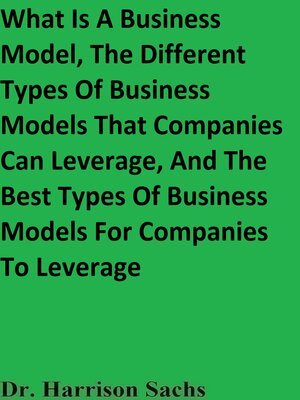What Is a Business Model, the Different Types of Business Models That Companies Can Leverage, and the Best Types of Business Models For Companies to Leverage
ebook
By Dr. Harrison Sachs

Sign up to save your library
With an OverDrive account, you can save your favorite libraries for at-a-glance information about availability. Find out more about OverDrive accounts.
Find this title in Libby, the library reading app by OverDrive.



Search for a digital library with this title
Title found at these libraries:
| Library Name | Distance |
|---|---|
| Loading... |
This essay sheds light on what is a business model, demystifies the different types of business models that companies can leverage, and reveals the best types of business models for companies to leverage. Succinctly stated, a business model is a framework for how a business generates revenue. A business model is far more intricate than just serving as the underpinnings of a meticulously detailed plan appertaining to how a business intends to generate profits. A business model does not only shed light on a businesses' daily operations, but also identifies how it plans on generating value for its stakeholders. A business model also identifies the target market of the business and the foreseeable expenses that the business is apt to incur during its lifespan. A business model is multifaceted since it sheds light on a multitude of disparate facets of a business. A business model can also identify a businesses' potent competitive advantages and its ample value chain activities. Furthermore, a business model can also identify a businesses' daily objectives and overarching goals. Moreover, a business model can also identify a businesses' value proposition, mission statement, and vision. Additionally, a business model can also identify how a business plans on distinguishing itself among its competitors as a solutions provider in the niche market that it competes in. A business model also sheds light on the core strategies that a business plans to leverage to attain profitability. A business model can for instance also identify multiple revenue generating strategies if the business has multiple revenue streams. A business model can also identify critical metrics for measuring success. A business model can also identify marketing strategies and marketing tactics that a company plans to utilize when marketing product offerings and/or service offerings. Companies can bolster their brand recognition, brand loyalty, and brand equity by releasing product offerings that have tremendous utility and that are able to eminently assuage the unmet needs among their target market. A business model can also identify customer retention strategies that a company plans to utilize to secure the lucrative lifetime values of their customers. A business model unequivocally sheds light on multiple facets of a business. A business model also identifies a businesses' product offerings and service offerings. Furthermore, a business model also identifies the pricing strategies that a business plans on leveraging for pricing their product offerings and service offerings Moreover, a business model can also identify how a business plans to innovative its product offerings and/or service offerings to further distinguish itself among its competitors. A company should be innovative partially so that its brand is far less apt to be stigmatized as a copycat brand. When a company's brand becomes perceived as a copycat brand due to it not being distinguishable from similar brands in terms of their offerings, then it becomes all the more apt to lose market share, especially if it competes in a highly competitive market against competitors who possess potent competitive advantages, enormous marketing prowess, a behemoth brand across social media platforms, a massive customers base, a sizeable brand advocate base, and innovative product offerings and service offerings. A business model also identifies a businesses' costs, such as its operating costs and overhead costs. In addition to identifying a businesses' cost structure, a business model can also identify cost reduction strategies appertaining to how a business plans to decrease its operating costs in the pending future. By reducing its operating costs, a business can...







